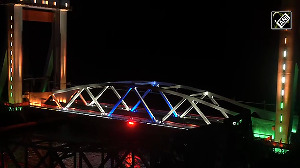Three car bombs exploded in quick succession in the Red Sea resort of Sharm el-Sheik early on Saturday, ripping through a hotel and a coffee shop packed with European and Egyptian tourists. The province governor said at least 88 people died in the deadliest attack in Egypt in nearly a decade.
The powerful blasts, beginning at 1:15 a.m., rattled windows miles away and sent panicked vacationers streaming out of hotels and clubs. Smoke and fire rose from Naama Bay, a main strip of beach hotels in the desert city at the southern tip of the Sinai Peninsula, also popular with Israeli tourists, witnesses said.
Dazed tourists milled about the darkened streets as Egyptian rescuers searched for dead and injured. Bodies of the dead lay under white bed sheets or were loaded in plastic bags into ambulances, while other emergency vehicles sped away with the wounded.
"There seemed to be a lot of bodies strewn across the road" near one cafe, British policeman Chris Reynolds, visiting from Birmingham, England, told the BBC by telephone. "It was horrendous."
There was no immediate claim of responsibility for the attack, which came nine months after simultaneous bombings hit two resort further north in Sinai, killing 34 people.
One of the explosives-laden cars smashed through security into the front driveway of the Ghazala Gardens hotel and exploded, said South Sinai province's governor, Mustafa Afifi-- suggesting it was a suicide bomber, though he did not specify that.
Large swaths of the front walls of the hotel-- a sprawling 176-room resort complex about three stories tall-- were collapsed and burned. The reception area was "completely burned down, destroyed," Amal Mustafa, 28, an Egyptian visiting Sharm with her family, told The Associated Press after driving by the site.
A second car bomb exploded in a parking area near the Movenpick Hotel, also in Naama Bay, said a receptionist there who declined to identify himself.
The third detonated at a minibus parking lot in the Old Market, an area about 2 1/2 miles from where many Egyptians and others who work in the resorts live. The blast ripped through a nearby outdoor coffee shop, killing 17 people, believed to be Egyptians, said a security official in the operations control room in Cairo monitoring the crisis.
Three minibuses were set ablaze. It was not clear if they were carrying passengers, the official said.
After the blast, "I went to my balcony and saw fire and smoke rising from the car that exploded, which was a taxi," said Ibrahim al-Said, 35, a Sudanese man who lives in the Old Market.
Afifi, speaking to the state news agency, said 49 people were killed. Security officials said around 200 were wounded. They-- like the crisis control room official-- were speaking on condition of anonymity because they were releasing information not yet announced by the Interior Ministry. The ministry's official toll stood at 31 dead and 107 wounded.
The control room official initially said there had been as many as seven blasts, including four car bombs, but he later corrected that report, saying witnesses and police were thrown off by echoes and secondary blasts.
The dead in the Sharm blasts included British, Russian, Dutch, Kuwaitis, Saudis, Qataris and Egyptians, a security official said.
Saturday's bombings were the deadliest since 1997, when Islamic militants killed 58 foreign tourists and four Egyptians at the Pharaonic Temple of Hatshepsut outside Luxor in southern Egypt.
That was the last major terror attack in Egypt for years, until last October's bombings at hotels in the Sinai resorts of Taba and Ras Shitan, about 100 miles northwest of Sharm on the Israel border. Egyptian authorities said that attack was linked to Israeli-Palestinian violence, and they launched a wave of arrests in Sinai.
President Hosni Mubarak has a residence in Sharm el-Sheik, at a resort several miles outside Naama Bay and often spends weeks there at a time in the winter. But during the summer, he stays at a residence in the northern city of Alexandria.
A London police officer, Charlie Ives, who was on vacation, told BBC TV that he was in a cafe about 50 yards from two of the explosions.
"It was mass hysteria really. We tried to calm people down," he said. He said the blast was so strong, "We were virtually thrown from the cafe."
Another British tourist, Fabio Basone, was in Naama Bay's Hard Rock Cafe when he heard a small explosion, then a larger one.
"We went outside on to the street where we were met with hundreds of people running and screaming in all directions," he told BBC. "I saw the front of a hotel had been blown away. ... There were two bodies on the floor but I don't know if they were dead."
Scores of ambulances from cities in northern Sinai were headed to Sharm, as were doctors from the Health Ministry in Cairo.
Kurtis Cooper, a State Department spokesman, said the United States condemned the attacks and offered assistance to the Egyptian government.
"There can be no excuse for the targeting of innocent civilians," Cooper said.
Egyptian Tourism Minister Ahmed al Maghrabi said the attacks were "meant to terrorize people and prevent them from moving and traveling." Speaking to the Nile News Channel, he vowed they would not hurt Egypt's crucial tourism industry.
Thousands of tourists are drawn to Sharm for its sun, clear blue water and coral reefs. It also has been a meeting place where world leaders have tried to hammer out a Mid-east peace agreement. Israel Prime Minister Ariel Sharon and Palestinian leader Mahmoud Abbas met there in February and agreed to a cease-fire.
AP correspondents Paul Garwood, Nadia Abou El-Magd, Salah Nasrawi and Maggie Michael in Cairo contributed to this report.






 © 2025
© 2025